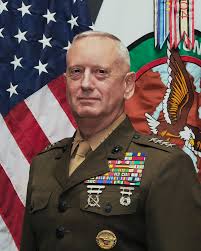War chief Mattis is ignorant
of Constitution’s war power
Does U.S. have war criminal as defense secretary?
A WALL commentary
 The
former Marine Corps general who heads America’s war-making
department does not know who is allowed to start a war under the
Constitution.
The
former Marine Corps general who heads America’s war-making
department does not know who is allowed to start a war under the
Constitution.
News media quoted James N. Mattis, secretary of defense, as warning that if North Korea launched missiles toward Guam, the situation could escalate to war (8/14/17).
“He was ambiguous as to how Washington would respond if Pyongyang launched a missile toward Guam as a show of force, and it landed far offshore.
“’War is up to the president, and perhaps up to Congress,’ Mattis said.”
No, General. Under our supreme law, war is not “up to the president.” Without any “perhaps,” it is up to Congress exclusively. The Constitution’s Article I, Section 8 gives Congress the power to “declare war,” provide armed forces, and govern them.
Only when Congress gives the word, does the president’s military rank of commander-in-chief come into play. It amounts to “nothing more than … first General and Admiral,” as Alexander Hamilton wrote (The Federalist, 69, 1788). But “it is the peculiar and exclusive province of Congress, when the nation is at peace, to change that state into a state of war…” (“Lucius Crassus, 1, 1801).
President Thomas Jefferson acknowledged in a message to Congress, 1805, that “Congress alone is constitutionally invested with the power of changing our condition from peace to war….”
Likewise James Madison, “Father of the Constitution,” wrote in 1793, “The power to declare war … is fully and exclusively vested in the legislature …. The executive has no right, in any case, to decide the question, whether there is or is not cause for declaring war.”
Five years later, Madison wrote, “The constitution supposes, what the History of all Governments demonstrates, that the Executive is the branch of power most interested in war and most prone to it. It has accordingly with studied care vested the question of war in the Legislature” (letter to Jefferson).
And George Washington, who presided over the Constitutional convention of 1787 wrote in 1793, “The Constitution vests the power of declaring war with Congress; therefore no offensive expedition of importance can be undertaken until after they shall have deliberated upon the subject and authorized such a measure” (letter to Gen. William Moultrie).
To declare war meant to commence war. That had been established usage for centuries, according to Professors Francis D. Wormuth and Edwin B. Firmage. They wrote in To Chain the Dog of War (Dallas: SMU Press, 1986, p. 20), “Contemporary usage makes it clear that the language ‘Congress shall have the power … to declare war’ gave to Congress the exclusive right to initiate war.”
(See more in “The Founding Fathers on the Constitution’s War Power” and, below, “Modern Commentators on the Constitutional War Power” and “Court Rulings Affirming the War Powers of Congress.”)
So Mattis is hazy on constitutional law. What about international law? Some have accused him of committing war crimes in Iraq. His actions there gained him the nickname “Mad Dog” Mattis.
Reports indicate that under his command at the siege of Fallujah in 2004, marines killed thousands of civilians, including children; prevented residents from escaping; shot at ambulances and doctors; used banned munitions; and destroyed the city. General Mattis also reportedly ordered a wedding party attacked and whitewashed marines who murdered civilians.
Executive still prone to war
|
|
|
A survivor of the 2004 Mattis siege of Fallujah points at what's left of his home. |
President Donald Trump has not expressed himself on the war power, but he has perpetuated and escalated Obama’s undeclared wars in Afghanistan, Iraq, and Syria. He is determined to “win,” as though engaged in an athletic contest. As a result, civilian casualties have soared since Trump took office on January 20, 2017. He condemns his predecessor’s peaceful settlement with Iran as a “disaster,” threatens to smite North Korea with “fire and fury,” and lets the military do whatever it wants.
As a candidate, Trump talked peace, e.g., “War and aggression will not be my first instinct. You cannot have a foreign policy without diplomacy…. America will continue … forever to play the role of peacemaker” (Washington, DC, April 27, 2016). Now that he is president, war and aggression appear to be his first instinct. That is nothing new for latter-day presidents.
Although America had not been invaded since the War of 1812, the Department of War acquired the euphemistic title of Department of Defense in 1947.
Since then, it has never had to defend United States territory for one moment. It has carried out attacks on such lands as Korea, Vietnam, Cambodia, Laos, Grenada, Panama, Yugoslavia, Afghanistan, Iraq, Libya, and Syria. To my knowledge, none of those nations had ever planned to come here to bomb and shoot us.
Congress did not initiate those wars. The only one it validly authorized was the first U.S. war on Iraq and only for a limited purpose, liberating Kuwait. Anyway, George Bush, Sr., instigated that war — exceeding the constitutional function of a president — and went far beyond his mandate through vicious bombing of civilians in Baghdad.
His son’s attack on Afghanistan in 2001, which has become America’s longest war — 16 years in October 2017 — was never declared by Congress. A measure ostensibly letting the president use force against 9/11 culprits never even mentioned Afghanistan. Besides, they were mostly Saudis.
Nor was Bush Jr.’s attack on Iraq in 2003 over imaginary weapons of mass destruction properly authorized. Congress approved a White House measure to let him decide whether to use force against Iraq — a decision that was up to Congress, not up to the president, under the Constitution. Of course, U.S. treaties have long prohibited the launching of war altogether. They include the Kellogg-Briand Pact, the United Nations Charter, and the North Atlantic Treaty.
As for the other wars, presidents did not even go through the motions of involving Congress when they started them.
If Congress intends to continue to stand by timidly and let the executive usurp its constitutional war power and launch aggressive conflicts — which has been the case ever since 1950 when Harry Truman invaded Korea — let it at least give the Department of Defense a more accurate title. Return to the original name, Department of War — although Department of Military Aggression or simply Department of Offense might be better yet.
By
Paul W. Lovinger
Sept.
1, 2017
